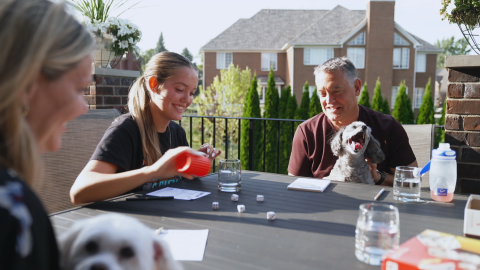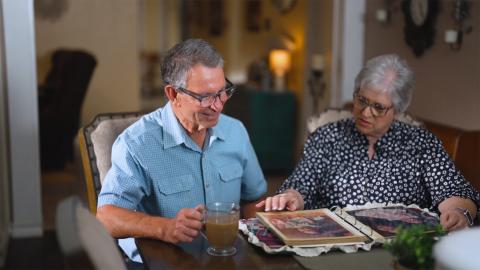PTSD Nearly Sent Mom to Grave
“I was trained from a very young age to portray to the audience that everything is beautiful and okay.” Ballet was more than creative expression for Julie Busler; it was an escape. She was eight when her mother was diagnosed with cancer. As Julie pursued her dreams of perfection, dancing with the Boston Ballet and at Julliard, her mother’s condition deteriorated.
“In ballet, you are trained that even if your toes hurt, you act like it's effortless. The only way I knew to survive was just shove everything deep down and really pretend I was okay.”
After eleven difficult years, her mom died when Julie was a sophomore in college. “I just plummeted into this deep darkness. Watching her die was so traumatic. So, there would be like nightmares and flashbacks. I still had just shoved all this depression and grief and sadness so far down.”
Two years later, Julie gave her life to Christ. Soon after, she married Ryan, and they started a family. Leaving dance behind didn’t stop Julie from striving for perfection in her new roles as a Christian, wife, and mother.
“I was just so confused, I'm doing all the right things and I do feel joy and excitement like when I share about Christ with somebody, or I experience a really happy moment with my children, but at the same time I feel so sad. How can this be? And I was ashamed about that, so, I just pretended the depression wasn't there.”
Eight years after she lost her mom, Julie was pregnant with her third child when she got a devasting email. Her father had committed suicide. “I just sunk to the floor in disbelief and I just couldn't stop crying. I was barely surviving. I suddenly feel abandoned. I'm like, ‘How could you do this to me?’ For a while I translated that to my relationship with God. Is God going to abandon me? Especially if I don't perform, if I'm not a good enough Christian?”
About that time, she and her husband decided to move their family to the Middle East to serve as missionaries. Over the next six years, Julie’s depression got harder to hide. “These intrusive thoughts started to pop in my head: ‘It would be okay if I didn't wake up. I love my family, but I'm so tired and there's just been so much loss. What's the point of living any longer?’ I thought, “It'll never get better. I'm in so much pain and I want the pain to stop.”
Those thoughts would just intensify. When I saw my thoughts go from just these passive suicidal thoughts all the way to plans, I knew that if I don't tell somebody I'm not going to survive."
Now thirty-three, Julie finally told a close friend how she was feeling. She urged her to tell her husband, who convinced Julie to see a therapist. “I really thought only crazy people go to psychiatrists. It was this moment of humbling, realizing I'm just as human and broken as the women I came to reach.”
Julie was diagnosed with major depression disorder and PTSD. She was hospitalized and given electroconvulsive therapy and medication. Doctors also showed Julie the scans of her brain. “This color is indicating depression, and this color and this activity is indicating PTSD. And so, for the first time I'm really seeing, ‘Wow, these doctors can see this medically in my brain. It's not just a faith problem.”
After her release, Julie and her family left the mission field and moved home to Oklahoma. The stress made Julie’s depression worse, and she was devastated to end up back in the hospital. “The first hospital stay didn't cure everything. And so, I'm just a complete failure at this point.”
Julie was still in the hospital when her friends came for a visit. Something one of them said got Julie’s attention. “She said, ‘Julie, I think that you're in the valley of the shadow of death.’ That little bit of Psalm 23 that she said to me lit this little flame of hope. Something perked up inside of me at hearing that.”
A few minutes later, after her friends left, Julie went to the common area. “I'm sitting with this other patient who I don't know, and she gets up and walks past me and she says, really to no one, just out loud, ‘I will fear no evil for you are with me.’ So, I'm thinking, okay, 'Is God talking to me?' Maybe God hasn't abandoned me.”
The next day, Julie was seen by a doctor she’d never met. “And the first thing he says to me is, ‘Julie, have you ever read Psalm 23?’ And it was in that moment where I thought like, 'I am not forgotten by God. I'm not abandoned. He knows exactly where His sheep is and He is my shepherd.”
Julie came home from the hospital with renewed hope and faith. In addition to taking medication, she began reading her Bible every day. “I would make myself get up. Even when I didn't feel like it, I would read. And eventually that became just this delight every morning. And as I went through the Bible, I started to see the whole picture and really who God is. I started to see sorrow is not sinful. Sorrow and joy can coexist, that’s what Paul says. I've learned that when I feel sadness, it's okay. It's not gonna take me out. Those are things that I might struggle with and live with, but who I am is accepted, and loved, and cared for, with this hope of heaven that is secure. It was the word of God that would transform my mind.”
Now, Julie and her family are thriving and learning to live with her illness as they follow Christ together. “We don't have to suffer in silence. We were not meant to live life alone. We were meant for community and true community happens when we are real with one another. Mental illness is not a faith problem. We most certainly need faith to thrive with mental illness, but it's also an illness as the name implies. God has provided people who have this knowledge. Medicine and therapy are good gifts, but they're incomplete without Jesus. Jesus alone is the hope.”




